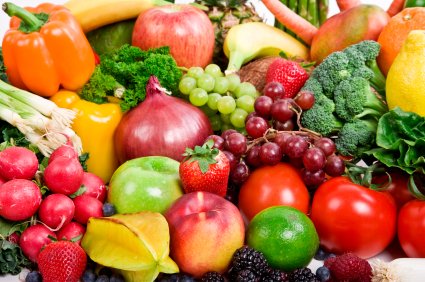Dieters are often advised to fill their plates up with fruit and vegetables at meal times to avoid gobbling down calorie laden fare later in the day. But it is not an effective long-term diet solution, a new study has claimed.
Eating fresh and dried fruit before a meal was found to help people feel fuller and eat slightly less during the main course.
But being on a fruit- and vegetable-heavy diet for months made no long-term difference in the volunteers assessments of their own hunger and fullness, American researchers found.
Furthermore, drinking fruit juice before a meal actually boosted hunger and weight gain for some participants in research carried out by Purdue University in West Lafayette, Indiana.
When they started with fruit juice instead, the volunteers ended up consuming up to 100 additional calories over a meal.
This researchers say, is because people will often mistake feelings of thirst for hunger and do the juice does not actually go toward making them full
The findings go against the theory that people should “fill up” on lots of fruit and veg to help them feel full for longer and prevent overeating on sugary and fat filled snacks.
The findings follow results from the same trial showing 34 participants – some overweight or obese, some a healthy weight – gained between 3.5 and 5 pounds when they were given eight weeks of fruit juice to incorporate into their diet.
Heavier participants, in particular, also gained weight when they received extra fresh fruit and vegetables.

Richard Mattes from Purdue University in West Lafayette, Indiana, and his colleagues found that when they fed volunteers a regular lunch of all-you-can-eat macaroni and cheese, they ate an average of 785 or 821 calories of it, depending on the day.
When the same participants started a meal with fresh and dried fruit, then went on to the main course, they ended up eating 678 calories of lunch, the fruit course included.
When they started with fruit juice instead, the volunteers took in a total of 891 calories.
People ate about 400 more calories, on average, during the test day when they started lunch with juice, compared to when they started with solid fruit, according to the findings published in the International Journal of Obesity.
But those results in favor of fresh and dried fruit did not hold up over the longer-term, Richard Mattes and his team found.
When the researchers provided the volunteers with 400 to 550 calories of either fruits and vegetables or fruit juice each day for eight weeks, there was no change in how they rated their hunger or fullness at regular intervals during each test period.
That means simply adding fruits and veggies to meet nutritional guidelines may not be enough to help people stay full and lose weight – and may actually make it harder for them to shed extra pounds, researchers said.
Richard Mattes and his colleagues advised “careful implementation of recommendations” through counseling or other nutrition programs to make sure people taking steps to improve their diet do not end up accidentally putting on more weight.
“If you tell people to add anything to their diet, you’re going to potentially have no weight loss, or weight gain, even with fruits and vegetables,” said Barbara Rolls, chair of nutritional sciences at The Pennsylvania State University in University Park.
The theory was especially true for beverages since the body regulates hunger and thirst differently – and people often don’t think to eat less to make up for juice or other calorie-filled beverages.
